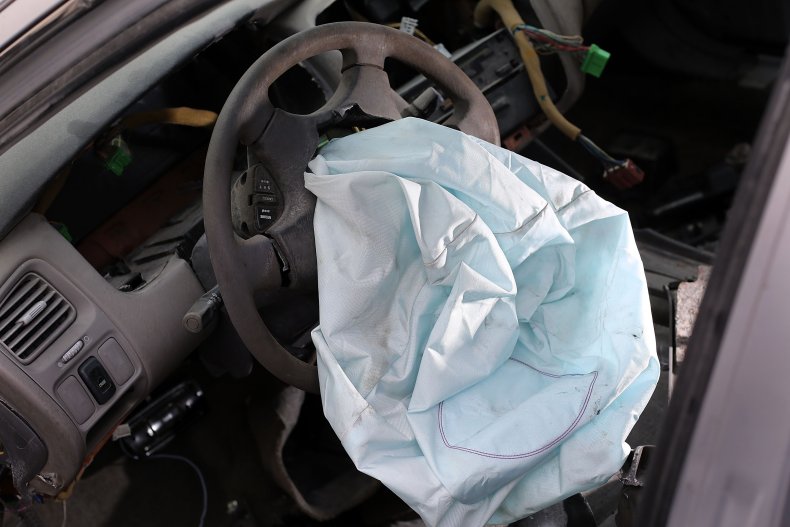U.S. Company Refuses to Recall 67 Million Airbag Inflators Over Safety Fears
A U.S. firm has refused to recall 67 million airbag inflators which safety officials claim may "create an unreasonable risk of death and injury" for drivers and passengers.
ARC Automotive Inc., which is based in Knoxville, Tennessee, disputes the admittedly "tentative" findings by regulators from the National Highway Traffic Safety Administration (NHTSA), who have been investigating the parts which are used in various makes and models of cars throughout the country and beyond.
NHTSA fears at least 2 people were killed in the U.S. and Canada, with 7 more injured, after allegedly potentially defective ARC inflators ruptured, according to a letter it sent to the automotive company this week.
The safety agency's investigation began back in 2015 and gradually expanded in scope over time. The letter, posted on Friday by NHTSA to ARC's vice president of product integrity Steve Gold, says: "NHTSA is issuing this recall request letter to notify you that the Agency has tentatively concluded that a defect related to motor vehicle safety exists in the frontal driver and passenger air bag inflators under investigation [...] Over pressurization of the inflator has the potential to cause it to rupture resulting in metal fragments being forcefully propelled into the passenger compartment."

However, the letter signed by Stephen Ridella, director of NHTSA's Office of Defects Investigation, went on to say that testing was conducted in April 2018 in which, "[n]o anomalies were detected in any of the deployments. None of the tested inflators ruptured."
Nevertheless, the agency detailed 7 concerning airbag deployments in the U.S., 1 in Canada, and 1 in Turkey. Most resulted in facial injuries for the drivers, but two allegedly resulted in fatalities. A driver in Michigan died in August 2021 after a driver-side airbag inflator in a 2015 Chevrolet Traverse ruptured, the NHTSA said. And back in July 2016, a driver in Canada died after the driver-side airbag inflator ruptured in a 2009 Hyundai Elantra, the agency said.
"Based on currently available information, NHTSA has tentatively concluded that a defect related to motor vehicle safety exists in the subject frontal driver and 4 passenger air bag inflators and demands that ARC issue a Part 573 Recall Report addressing that safety defect," the agency went on to demand of ARC. "The subject inflators pose an unreasonable risk of death or injury that may result from an item of motor vehicle equipment that, when not defective, is designed to save lives.
"Airbag inflators that project metal fragments into vehicle occupants, rather than properly inflating the attached airbag, create an unreasonable risk of death and injury. Accordingly, the Agency makes this demand that ARC immediately submit to NHTSA a Part 573 Recall Report that identifies a safety defect in the subject driver and passenger airbag inflators. NHTSA's request that ARC conduct a safety recall does not constitute a formal conclusion by NHTSA with respect to the evidence in its investigative file."
The recall would cover a large portion of the 284 million vehicles now on U.S. roads, the Associated Press reported, but the percentage is difficult to determine.
ARC rejected the agency's demands for a recall, releasing a statement on Friday night to the Associated Press saying: "We disagree with NHTSA's new sweeping request when extensive field testing has found no inherent defect." However, it confirmed that General Motors is recalling nearly 1 million vehicles fitted with inflators from ARC, such as the carmaker's 2014-2017 Buick Enclave, Chevrolet Traverse, and GMC Acadia SUVs. Owners will be notified by letters due to be sent out in late June.
Newsweek reached out to ARC by email on Saturday requesting further information and comment.
After ARC's dismissal of the NHTSA's findings and its refusal to enact a recall, it's thought the agency may schedule a public hearing into the case. Ultimately, it could then take the company to court in order to force a recall, according to the Associated Press.
ARC is not the only manufacturer in the automotive industry to have faced demands for recalls.
Tech mogul Elon Musk faced Tesla trouble in November when 40,000 cars were recalled over fears some models were losing power steering assist.
While back in May last year, 239,000 vehicles made by Korean firm Hyundai were recalled due to concerns that seatbelts could explode and shoot metal fragments through the car.
Back in February 2021, more than 153,000 Ford Ranger trucks from 2004-2006 were recalled over potentially dangerous airbags made by the now-bankrupt manufacturer Takata. Thousands of other models, such as Ford, Lincoln, and Mercury vehicles, were also affected.








